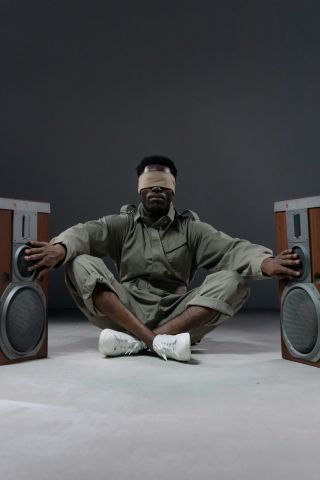Hallucination
Musical Hallucinations or a Phrogger Living in Your Attic?
Nearly 27% of people experience music hallucinations.
Posted July 17, 2024 Reviewed by Monica Vilhauer
Key points
- Some anti-depressants may be responsible for auditory hallucinations.
- 41% of OCD patients have musical hallucinations.
- Hallucinations in those with hearing loss may be similar to those who have lost a limb feeling phantom pain.
- Social anxiety can contribute to heightened awareness of noise and misinterpretation of sounds.
Flora had begun to believe that there might be someone secretly living in her addict, a phenomenon some true crime genres have referred to as Phrogging.
"On the upside," Flora said with a laugh, "At least he or she has excellent taste in music."
At least once or twice a week Flora would hear music playing in her home. The songs were familiar and reminded her of times spent with her father when she was younger.
Hearing the music wasn't unpleasant for Flora until she realized no one else could hear what she did.
Hallucinations Aren't Only for Schizophrenics
If you hear the word hallucination and immediately think of schizophrenia, it's for a very good reason. Studies report that 70% of schizophrenics experience auditory hallucinations, most frequently voices telling them what they should and should not do.
However, when it comes to hearing music where there is none, only 26% of people with schizophrenia have experienced music hallucinations compared to a whopping 41% of people with obsessive-compulsive disorder.
A 2013 study revealed that 26.8% of patients receiving outpatient therapy — patients just like you and I — had experienced music hallucinations.
Let's put this into perspective: Given one hundred average people in therapy, 27 should reasonably report having had musical hallucinations. In the United States, 27% of individuals have blue eyes. Given one hundred average people, 27 should reasonably have blue eyes.
Musical hallucinations (MH) are a lot more common than most of us thought. But, what causes this phenomenon?
Hearing Loss
This is the most common cause of MH. What we think we "hear" when we listen to music is actually a compromise between what occurs as sound enters our ears and our brain's interpretation of that sound.
Under normal circumstances, the input, or sound, from our ears is so loud that the sound overrides how the brain fills in the gaps. But when someone is experiencing loss of hearing — especially if they are not aware of the degree of hearing loss they are suffering from — the communication between the ear and brain functions like a radio filled with static.

The brain struggles to make this communication clear by relying on what is familiar and may default to treating sound as if it is music in the absence of more information.
Suddenly, the distant sound of a lawnmower as the wind whistles through the trees may be interpreted as a song connected to a core memory from long ago.
The brain thinks it has solved the problem, although what it has left behind is a rather confusing hallucination.
Psychiatric Diagnosis
A 2015 study by Golden & Josephs found that 39% of MH were caused by psychiatric disorders including: Depression, Anxiety, Obsessive Compulsive Disorder (OCD), Schizophrenia, Bipolar Disorder, and Schizoaffective Disorder.
There is a surprisingly high rate of those with OCD having experienced MH. Some evidence suggests that people with OCD are more sensitive to tense music and may have an increased desire for harmony in music. The increased level of anxiety and awareness that people with OCD have may make it important to find a logical place for all of their sensory perceptions — similar to the repetitive ritualistic behavior they engage in.
This might put the individual with OCD in a similar place as the person with hearing loss: wanting very much to make sense of random sounds to feel safer. Perhaps the brain makes sense of several random sounds by subconsciously covering these sounds into a familiar song. A similar phenomenon may occur with people who suffer from social anxiety, who also report high rates of MH.
The connection between MH and hearing impairment has led researchers to hypothesize that MH is a “release phenomenon,” in which sensory deprivation operates similarly to phantom limb syndrome, in which amputees experience sensations in a limb that is no longer there.
Neurologic Disorders
Alzheimer's and Parkinson's as well as other lesser-known Neurological Disorders accounted for roughly 25% of MH, and the music these individuals heard was often religious, patriotic, or songs reminiscent of their childhood. Many of these people did not realize they were having audio hallucinations. They instead thought that a neighbor was playing their music too loudly.
Drug Toxicity or Withdrawal
Substance use accounts for 12% of MH, and these individuals are most likely to hear so-called elevator music — familiar songs without words.
Anti-depressants have also been known to cause music hallucinations, in theory.
Anti-depressants bring about relief by changing the level of serotonin and/or dopamine in your brain, which could result in causing MH — but not because of the anti-depressant itself.
Serotonin and dopamine affect the neurotransmitter acetylcholine, which is responsible for muscle movement, memory, learning, and attention. Lack of a sufficient amount of cortical acetylcholine has been linked to hallucinations.
Heschl's Gyrus
Only 9% of music hallucinations are likely caused by brain damage, brain atrophy, or a lesion that develops anywhere on the auditory cortex. But some areas can be more severely affected by damage than other areas.
Heschl's gyrus (or the primary auditory cortex) plays a crucial role in processing sound and speech comprehension. Physical changes, damage or atrophy in Heschl's gyrus has been closely linked with verbal hallucinations and schizophrenia. In addition, the cortical thickness in Heschl's gyrus is directly related to the strength of the auditory hallucination.
Those with music hallucinations as a result of damage to the brain frequently hear rock music or country-pop.
Conclusion
Science has managed to capture a picture of the average individual who is afflicted by musical hallucinations:
- Female
- Age 61 or older
- Suffers from hearing loss
- Takes medicine for high blood pressure, such as beta blockers and nytroglicerine
- Suffers from brain disease or brain atrophy
- Socially isolated
As research continues, we will have more information on what causes musical hallucinations and, therefore, more information on how to treat this disease.
References
Alvarez Perez P, Garcia-Antelo MJ, Rubio-Nazabal E. "Doctor, I Hear Music": A Brief Review About Musical Hallucinations. Open Neurol J. 2017 Feb 28;11:11-14.
Dierks et al. "Activation of Heschl’s Gyrus during Auditory Hallucinations," Neuron, Volume 22, Issue 3, 1999, Pages 615-621,
Schonwiesner et al (2007). "Heschl's Gyrus, Posterior Superior Temporal Gyrus, and Mid-Ventrolateral Prefrontal Cortex Have Different Roles in the Detection of Acoustic Changes," Journal of Neurophysiology, Vol 97, No. 3.
Tomita T, Yasui-Furukori N, Kaneko S., Visual hallucinations during duloxetine treatment in a patient with major depressive disorder. Clin Neuropharmacol. 2013 Sep-Oct;36(5)
Vitorovic, D. & Biller, J., "Musical hallucinations and forgotten tunes – case report and brief literature review." Front. Neurol., 07 August 2013. Sec. Neurology Education. Volume 4 - 2013
Erin C. Golden, Keith A. Josephs, 2015, Minds on replay: musical hallucinations and their relationship to neurological disease, Brain, Volume 138, Issue 12, Retrieved January 27 2022 https://doi.org/10.1093/brain/awv286



